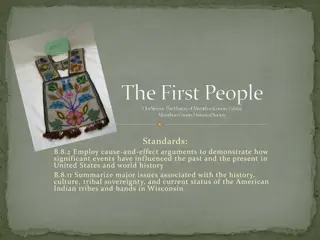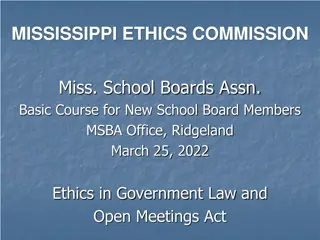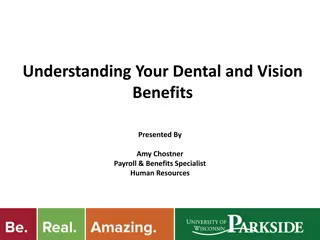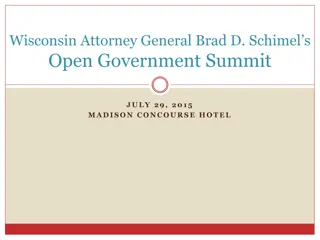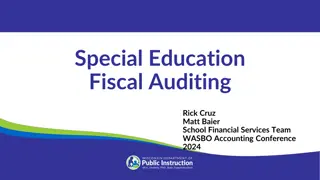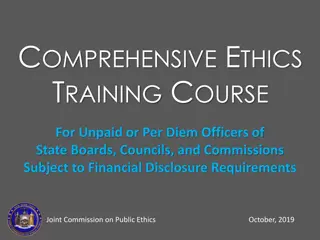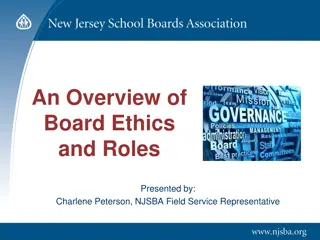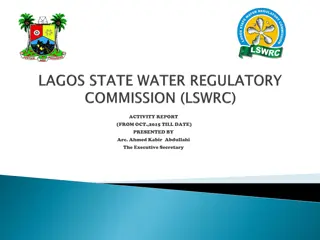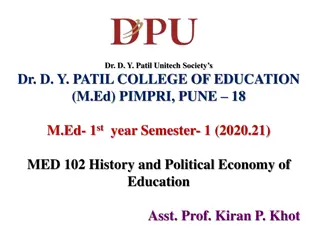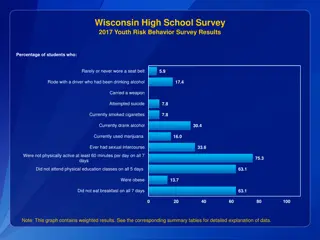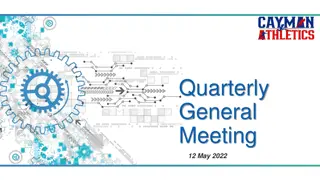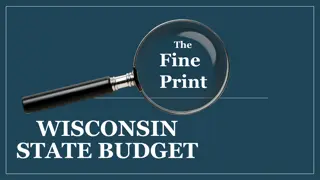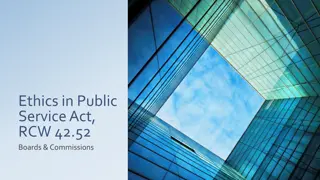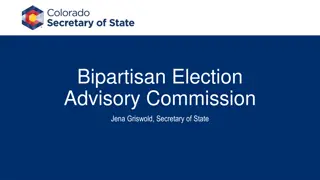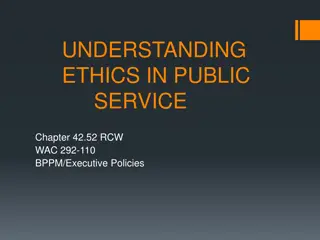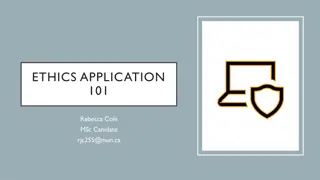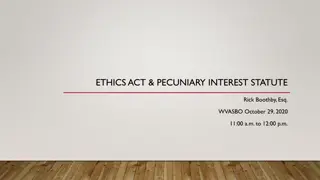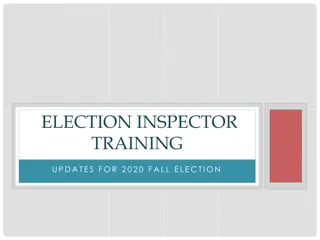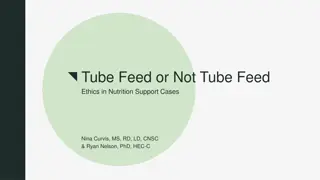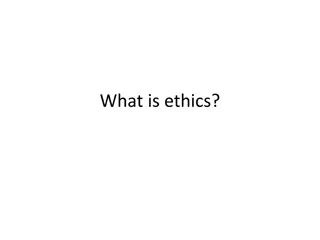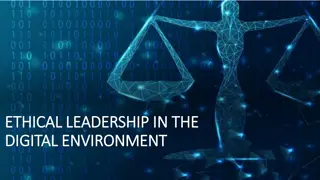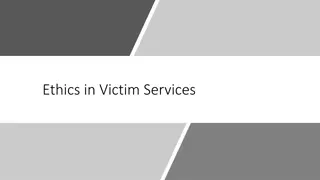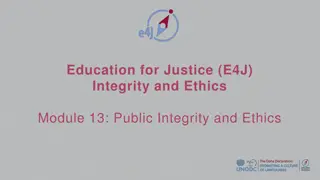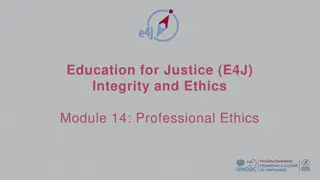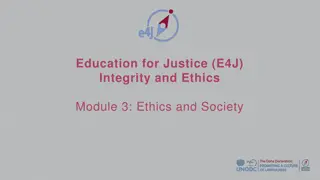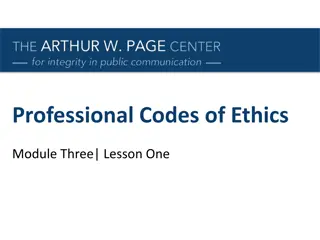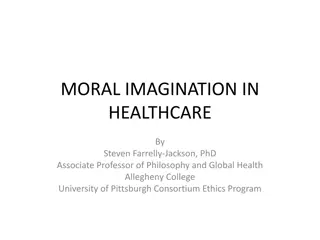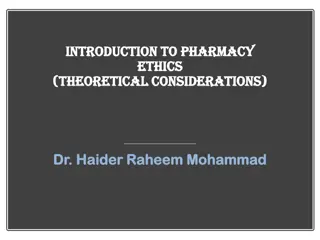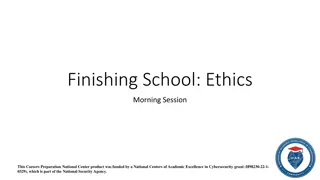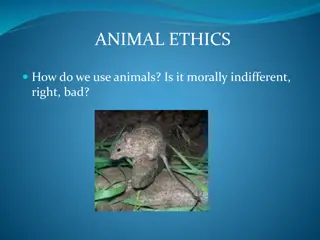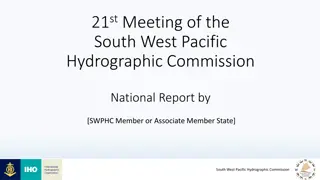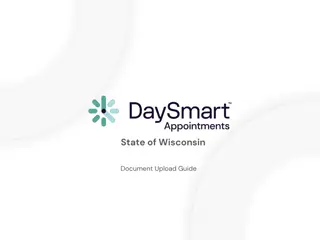State of Wisconsin Ethics Commission Overview
The State of Wisconsin Ethics Commission administers campaign finance laws, lobbying regulations, and the code of ethics for legislative employees. Established in 2015, the commission has six members who serve four-year terms and is responsible for providing guidance, investigating violations, and ensuring ethical conduct in government. With co-equal jurisdiction alongside district attorneys, the commission oversees a wide range of individuals and entities, including legislators, lobbyists, campaign committees, and public officeholders.
Download Presentation

Please find below an Image/Link to download the presentation.
The content on the website is provided AS IS for your information and personal use only. It may not be sold, licensed, or shared on other websites without obtaining consent from the author. Download presentation by click this link. If you encounter any issues during the download, it is possible that the publisher has removed the file from their server.
E N D
Presentation Transcript
State of Wisconsin Ethics Commission CAMPAIGN FINANCE, LOBBYING, AND THE CODE OF ETHICS FOR LEGISLATIVE EMPLOYEES Brian M. Bell, MPA Administrator David Buerger Staff Counsel
ABOUT THE ETHICS COMMISSION Created by 2015 Wisconsin Act 118 6 members Partisan Appointments 2 former judges, 4 others 4 year terms Headed by Commission Administrator One Staff Counsel; Six Other Staff Positons All actions require four votes Confidentiality: Advice & Investigations State of Wisconsin Ethics Commission
RESPONSIBILITIES Administer Wisconsin Statutes Chapter 11: Campaign Finance Subchapter III, Chapter 13: Lobbying Subchapter III, Chapter 19: Code of Ethics State of Wisconsin Ethics Commission
JURISDICTION Co-Equal Jurisdiction with District Attorneys, but historically Ethics Commission Legislators, aides, service agencies Governor, Lt. Governor, appointees, secretaries, deputies, executive assistants, administrators Justices and judges Lobbyists and Lobbying Principals (organizations) Most campaign committees Any individual holding a state public office District Attorneys Code of Ethics for Local Officials Local candidate and local referendum committees State of Wisconsin Ethics Commission
POLITICAL MARKET Conscientious Rail- road President to Dealer: Ah! Let me see. I think I ll take this bunch of Legislators at $5000 a head. The Senators, at - what price did you say? Dealer: Can t afford em less than $10,000 each. R.R.P.: Well, hand them over. I suppose I ll have to take the lot. Dealer: Anything else to-day? I have a lot of Editors, at various prices, from a Thousand down to Fifty Cents. R.R.P.: No, nothing in that way, to-day. But I want a Governor very much indeed, and will stand $50,000 for him. Get me a Wisconsin one, if possible! Cartoon published in Harper s Weekly of June 12, 1858, at the time of the Land Grant Investigation
IMPORTANT LAWSTO KNOW Lobbying 13.625 prohibited practices and exceptions Campaign Finance 50 Piece Rule and exceptions Code of Ethics Use of office for financial gain Influence and reward Food, drink, transportation, lodging Use of confidential information for private gain Unlawful benefit Conflicts of Interest State of Wisconsin Ethics Commission
LOBBYING: PROHIBITED PRACTICES WIS. STAT. 13.625 No lobbyist or lobbying principal may give to an agency official, legislative employee, any elective state official, or candidate for state elective office, or to the candidate committee of the official, employee or candidate: Lodging Transportation Food, meals, beverages Money or any other thing of pecuniary value Except State of Wisconsin Ethics Commission
CAMPAIGN CONTRIBUTIONS A lobbyist may deliver a contribution at any time A lobbyist may make a personal contribution if the window is open Between the first day to circulate nomination papers and the date of the election And a contribution to a candidate for legislative office can only be given by a lobbyist if the Legislature has concluded its final floor period and is not in extraordinary session A lobbyist may contribute to their own campaign at any time State of Wisconsin Ethics Commission
OTHER EXCEPTIONS Providing or receiving any thing of pecuniary value involving a relative or an individual who resides in the same household Lobbyists may provide educational/informational materials Providing or receiving payment or reimbursement for actual and reasonable expenses allowed under WIS. STAT. 19.56: Honorariums, Fees and Expenses Other very limited exceptions to the blanket prohibition on accepting anything of pecuniary value from a lobbyist or principal State of Wisconsin Ethics Commission
50 PIECE RULE WIS. STAT. 11.1205: Use of government materials by candidates No person elected to state or local office Who becomes a candidate for national, state, or local office May use public funds for the cost of materials or distribution for 50 or more pieces of substantially identical materials distributed after the first day to begin circulating nomination papers Except State of Wisconsin Ethics Commission
50 PIECE RULE - EXCEPTIONS Answers to communications of constituents Actions taken by a state or local administrative officer pursuant to a specific law, ordinance, or resolution which authorizes or directs action to be taken Communications between members of the Legislature regarding the legislative or deliberative process while the Legislature is in session Communications not exceeding 500 pieces by member of the Legislature relating solely to the subject matter of a special or extraordinary session, made during the period between the date the session is called and 14 days after the adjournment of the session State of Wisconsin Ethics Commission
SCHEDULINGAND COMMUNICATIONS Making campaign appointments prohibited. Recording hour and location of campaign appointments; incidental communications with campaign committee okay. Providing calendar information permitted. Refer campaign messages to candidate or campaign committee. State of Wisconsin Ethics Commission
USEOF OFFICEFOR FINANCIAL GAIN WIS. STAT. 19.45(2) No state public official may use his or her public position or office to obtain financial gain or anything of substantial value for the private benefit of himself or herself or his or her immediate family, or for an organization with which he or she is associated. Exceptions: Campaign contributions Donations to non-profits State of Wisconsin Ethics Commission
INFLUENCEAND REWARD WIS. STAT. 19.45(3) No person may offer or give to a state public official, directly or indirectly, and no state public official may accept from any person, directly or indirectly, anything of value if it could reasonably be expected to influence the state public official s vote, official actions, or judgment, or could reasonably be considered as a reward for any official action or inaction on the part of the state public official. State of Wisconsin Ethics Commission
FOOD, DRINK, TRANSPORTATION, AND LODGING WIS. STAT. 19.45(3m) No state public official may accept or retain any transportation, lodging, meals, food or beverage, or reimbursement therefor, except in accordance with 19.56(3). Exceptions: Official talk or meeting Unrelated to holding public office State benefit Reported as an expense by a political committee WEDC/Department of Tourism State of Wisconsin Ethics Commission
USEOF CONFIDENTIAL INFORMATIONFOR PRIVATE GAIN WIS. STAT. 19.45(4) No state public official may intentionally use or disclose information gained in the course of or by reason of his or her official position or activities in any way that could result in the receipt of anything of value for himself or herself, for his or her immediate family, or for any other person, if the information has not been communicated to the public or is not public information. State of Wisconsin Ethics Commission
UNLAWFUL BENEFITS WIS. STAT. 19.45(5) No state public official may use or attempt to use the public position held by the public official to influence or gain unlawful benefits, advantages or privileges personally or for others. State of Wisconsin Ethics Commission
CONFLICTSOF INTEREST WIS. STAT. 19.46(1): No state public official may: Take any official action substantially affecting a matter in which the official, a member of his or her immediate family, or an organization with which the official is associated has a substantial financial interest. Use his or her office or position in a way that produces or assists in the production of a substantial benefit, direct or indirect, for the official, one or more members of the official s immediate family either separately or together, or an organization with which the official is associated. State of Wisconsin Ethics Commission
STATEMENTOF ECONOMIC INTERESTS Annual requirement Must identify investments, real estate, businesses, and creditors as of the last day of the prior year. All direct sources of family income from prior year of $1,000 or more. All sources of income from prior year of $10,000 or more received from partnerships, sub S corporations, service corporations, and LLCs (including customers, clients, and tenants) in which your family has a 10% or greater interest. State of Wisconsin Ethics Commission
CAMPAIGNING Can a candidate take campaign pictures at the State Capitol? State of Wisconsin Ethics Commission
CAMPAIGNING Don t use any state resource for campaigning (email, computers, photocopier, etc.) Staff may not engage in campaign activity on public time or in public offices. May not solicit or receive contributions while engaged in official duties Do not use access to any non-public areas. State of Wisconsin Ethics Commission
USEOF OFFICEFOR FINANCIAL GAIN A nonprofit organization asked a Legislator if they could include as a raffle prize a lunch with a legislator , as part of their efforts to fundraise. Can the Legislator participate? State of Wisconsin Ethics Commission
USEOF OFFICEFOR FINANCIAL GAIN Candidates can solicit donations for a nonprofit organization with which they are associated The candidate or an immediate family member: Is a director, officer, or trustee Owns or controls, directly, or indirectly, and severally or in the aggregate, at least 10 percent of the outstanding equity Or a member of the candidate s immediate family is an authorized representative or agent State of Wisconsin Ethics Commission
TICKETS/LUXURY BOXES Old friend from college invites you Premium seats/skybox May you accept the ticket? State of Wisconsin Ethics Commission
ACCEPTING GIFTS Don t accept anything from a lobbyist or lobbying principal even if you pay for it. Don t accept items or services of more than trivial value that are offered to you because of your official position. You may accept something if it s not from a lobbyist and not related to your public office. You may accept something if it is available to the general public Must report on Statement of Economic Interests if over $50 (face value may not be true value) If spouse is the invitee and you are the guest, that is okay. State of Wisconsin Ethics Commission
DISPOSITIONOF GIFTS Treat the item as being given to the Legislature. Turn the item over to another state agency or to a public institution, such as a local school, library, or museum, that can use the item. Donate the item to a charitable organization (other than one of which the official or a family member is an officer, director, or agent). Return the item to the donor. If the donor is neither a lobbyist nor an organization that employs a lobbyist, purchase the item (by paying the donor the full retail value) and retain it. State of Wisconsin Ethics Commission
TEACHING A SEMINAR Invited by your alma mater to teach a seminar Can you teach the seminar? Can you be paid? State of Wisconsin Ethics Commission
COMPENSATIONFOR SERVICES Permitted to teach as a public official. Actually encouraged to go to meetings and gatherings to discuss processes, proposals, or issues affecting your office. May receive and retain reasonable compensation Must prepare/present without more than incidental reliance on state resources Still cannot accept from a lobbyist or lobbying principal Compensation includes gifts, tickets, entertainment, reimbursement of travel, lodging, meals for spouse. Must report compensation on Statement of Economic Interests State of Wisconsin Ethics Commission
WHERETO FIND MORE INFORMATION Wisconsin Statutes https://docs.legis.wisconsin.gov Advisory Opinions Prompt, Confidential, Authoritative Guidelines https://ethics.wi.gov Ethics@wi.gov https://ethics.wi.gov Phone: (608) 226-8123 Fax: (608) 264-9319 State of Wisconsin Ethics Commission



